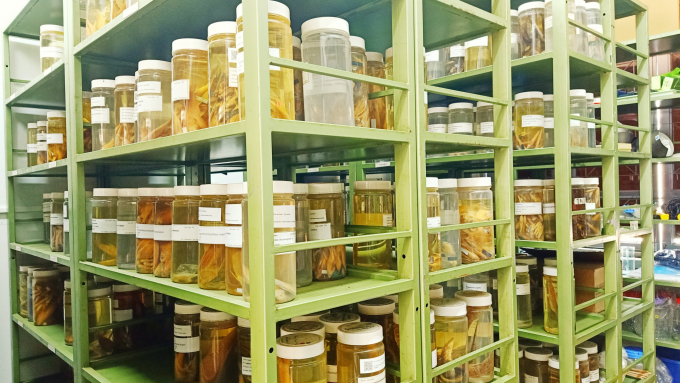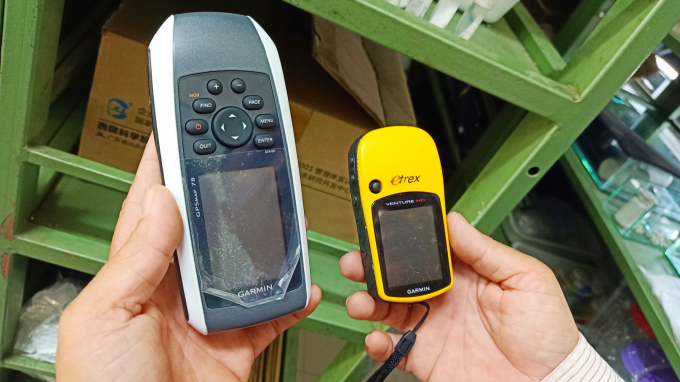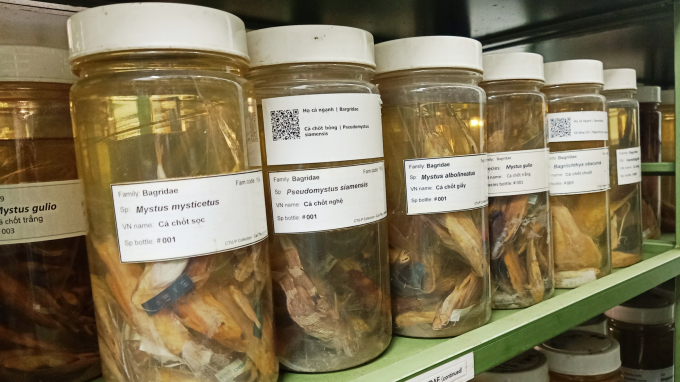May 19, 2025 | 17:40 GMT +7
May 19, 2025 | 17:40 GMT +7
Hotline: 0913.378.918
May 19, 2025 | 17:40 GMT +7
Hotline: 0913.378.918

Stores thousands of specimens of more than 500 species of fish in the Mekong River Basin . Photo: Kim Anh.
We visited the Department of Fisheries under Can Tho University, where thousands of fish specimens collected in the Mekong River basin are stored, to meet Dr. Vo Thanh Toan, Deputy Head of Department of Fisheries Economics and Management, Faculty of Fisheries for a guided tour of this special archive.
Witnessing the archive with my own eyes has taught me that aquatic resources in the Mekong Delta are rich and diverse. There are 22,000 specimens from over 500 different species of fish stored here, including freshwater, brackish and even some saltwater fish.
According to Dr. Vo Thanh Toan, the specimen archive has been established since the 1990s with the initial goal of serving the teaching and learning needs of lecturers and students.
Subsequently, the Faculty of Fisheries received support from many domestic and foreign organizations; the collection and preservation of fish samples were expanded; the number of specimens put into the archive also increased, resulting in a rather large scale archive as it is currently.

The preservation of fish specimens contributes to the conservation of aquatic resources in the lower Mekong region. Photo: Kim Anh.
According to our observations, these specimens are special in that even though they have been in preservation for a long time, they still retain their shape without decomposing. To explain this phenomena, Dr. Toan said that the preservation of specimen plays a decisive role in maintaining the archive. “The fish specimens are collected live, then soaked in a mixture of distilled water and 10% formaline solution for 10 to 15 minutes before processing and photographing.
In the past, fish specimens were mainly soaked in formaline solution for preservation. This method of preservation could last from 10 to 15 years. With the development of science and technology, as well as resources from organizations, the preservation of specimens is replaced by 96 degrees ethanol solution and stored in plastic bocal following Japanese technology", said Dr. Toan.
In addition to the preservation method, the storage temperature of the specimens must be cool enough at an average of 27 degrees Celsius. Technical staffs also regularly observe, monitor and check the stored specimens to limit damage.

Coordinates locators used in the process of collecting fish specimens. Photo: Kim Anh.
Additionally, all the collected specimens were recorded by lecturers in detailed information including: the coordinates of fish species distribution, seasons of appearance, time and frequency for the fish. These details serve as a premise for more in-depth scientific research on the diversity of fish species in the Mekong Delta.
The work of collecting and storing specimens is currently carried out by lecturers of the Faculty of Fisheries, Can Tho University; they aim to enrich and thicken the quantity and quality of fish species. Ultimately, this will create a basis for preservation and rational use of natural resources, especially the fish resources in the Mekong Delta.
With the support from the Japanese Foundation for Natural Environment Protection (Project Nagao) since 2010, Can Tho University represents Vietnam along with 3 countries in the Mekong Delta, namely Laos, Thailand and Cambodia, and conducts the collection of aquatic specimens on the main rivers.
Lecturers and scientists at the Faculty of Fisheries collected specimens from 13 provinces and cities in the Mekong Delta for nearly 10 years, divided into 2 phases. Phase 1 focused on collecting freshwater fish specimens along Hau river, Tien river. Phase 2 expanded the collection area to the estuaries of Tran De, Dinh An and Co Chien rivers as well as specimens from Phu Quoc city, Kien Giang province.
From 2010 to 2020, 22,000 fish collected from more than 322 species were kept at the "Fisheries and aquatic resources" laboratory under the Department of Fisheries Economics and Management, Faculty of Fisheries, Can Tho University with the goal of supporting teaching and scientific research in the field of fisheries and aquatic resources management. These include rare species such as coral fish, or endangered species including stingray, white pompano, cottonfish, manta ray, flower stingray, striped mackerel, etc.

The collection and archiving of specimens will be continued by lecturers of the Faculty of Fisheries to enrich the number and types of fish. Photo: Kim Anh.
From 2017 to 2021, with ODA loans from the Japanese government under the project to upgrade Can Tho University and the Southwest program led by Assoc.Prof.Dr. Tran Dac Dinh, the project has also contributed to increasing the number of fish species and specimens.
The research team conducted a species composition survey and collected fish specimens along the eastern coastal areas of the Mekong Delta provinces including Soc Trang, Bac Lieu and Ca Mau. As a result, the research team has recorded over 110 species of fish, belonging to 42 families of 15 orders. After identification, the fish specimens were photographed and kept, serving intensive scientific research in the future.
Explaining the motivation behind collecting and archiving specimens, Dr. Vo Thanh Toan added: “The Mekong Delta has a large wetland area, especially in the flood season; the system of estuaries in the Mekong Delta flowing into the East Sea has created a large estuary area. With favorable natural conditions, aquatic resources in the Mekong Delta have been known to be very rich and diverse, acting as the main source of protein for the locals. However, aquatic resources in recent years have been on a rapid decine in terms of quantity, quality and diversity due to over-exploitation and overuse; the ecosystem are also deteriorating in terms of area, water quality".
The management of aquatic resources in the Mekong Delta is necessary and meaningful in terms of science as well as economy and society. Many types of common fish are now dwindling to the point of extinction.
Therefore, it is necessary and urgent to re-evaluate the status of fish species in coastal areas of the Mekong Delta. The establishment and maintenance of the specimen room, in addition to the purpose of teaching, is also the site for domestic and foreign units to visit, learn, research and preserve Vietnam's aquatic resources, especially in the Mekong Delta.
On February 26, 2021, the World Wide Fund For Nature in Vietnam (WWF Vietnam) published a report on forgotten fish species, which clearly indicated that biodiversity in freshwater ecosystems is reducing at twice the rate of that of oceans and forests. There are 80 species of freshwater fish listed as "extinct" in the Red Book of the International Union for Conservation of Nature (IUCN). Giant catfish and barramundi native to the Mekong River are also critically endangered. Migratory freshwater fish populations have plummeted by 76% since 1970, large fish species have declined by 94%, and large fish weighing over 30kg have been wiped out in most rivers.
In 2013, Can Tho University Press published an Vietnamese-English "Handbook of common aquatic species in the Mekong Delta", detailing the identification of fish species in the Mekong Delta. This is a necessary resource to serve people directly exploiting aquatic resources, students, local fisheries resource managers. These targets can consult and understand the meaning of management and preservation of aquatic resources for efficient and sustainable exploitation.
Translated by Nguyen Hai Long

(VAN) 14 out of 35 domesticated elephants in Dak Lak province have had their living conditions improved, with 11 of them currently participating in the non-riding elephant tourism model.

(VAN) Muong Nhe Nature Reserve hopes that being upgraded to a national park will lay the foundation for forest protection efforts to be carried out in a systematic, modern, and sustainable manner.
/2025/05/16/3923-2-171845_52.jpg)
(VAN) Lower costs, higher yields, and improved soil quality are outstanding benefits that soybeans bring when integrated into the crop rotation system.

(VAN) The 'For a Green National Environment' programme aims to promote a green lifestyle, support businesses in implementing ESG practices, and turn Net Zero commitments into concrete actions.

(VAN) Cold-barn systems efficiently manage environmental and temperature conditions, which aids in the prevention of respiratory diseases in pigs and protects them from the vectors that transmit African swine fevers.

(VAN) To tackle challenges, the project 'Addressing key technical bottlenecks in the grouper supply chain in Vietnam' has been underway since 2024.

(VAN) The project 'Disease-Resilient and Sustainable Cassava Production Systems in the Mekong Region', funded by the Australian Center for International Agricultural Research (ACIAR), is being implemented from 2024 to 2028.